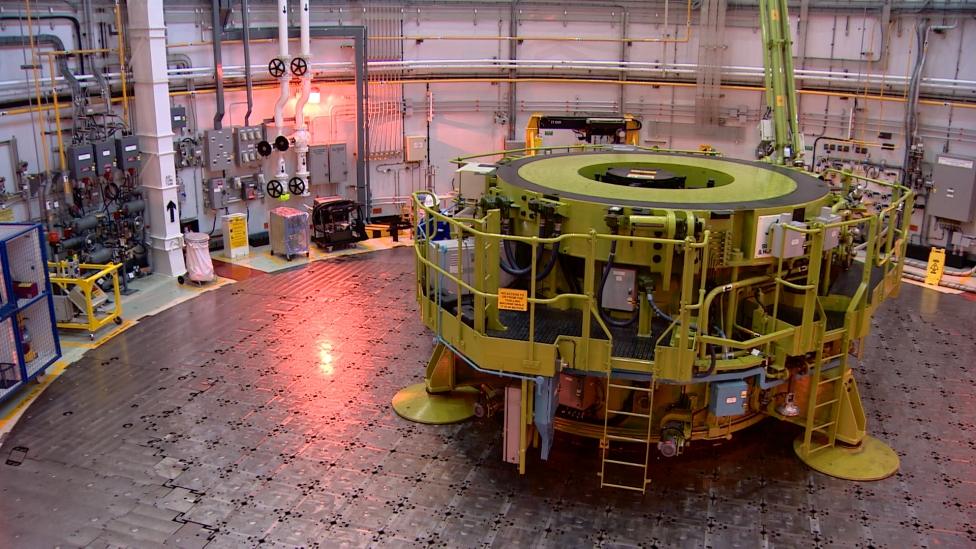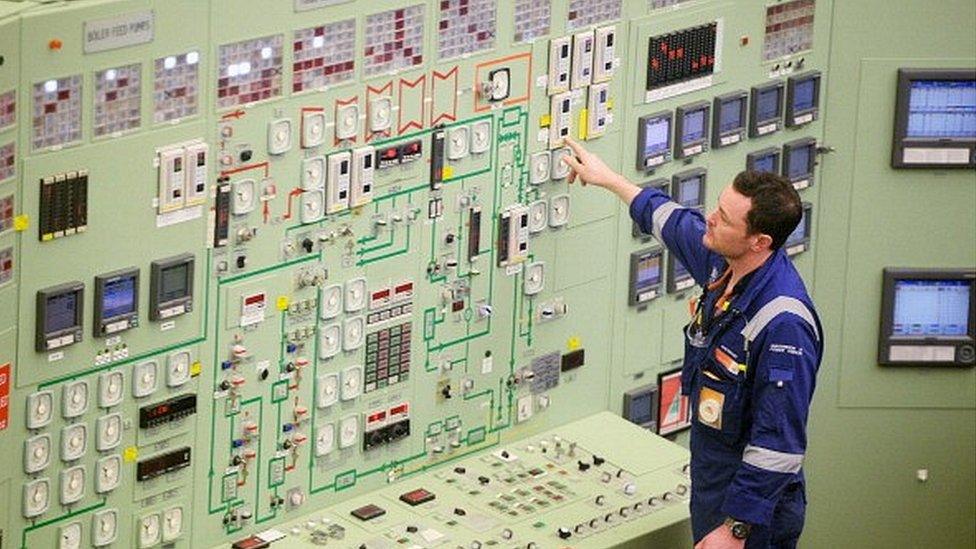Torness nuclear plant has operating life extended by EDF
- Published
Torness started generating electricity in 1988 and had originally been given a 30-year lifespan
The Torness nuclear power station on the east coast of Scotland is to have its life extended by at least seven years, operator EDF has announced.
In a stock market statement, EDF said the plant would now be operational until 2030 at the earliest.
Torness, near Dunbar in East Lothian, had been due to be decommissioned in 2023.
The facility employs more than 700 people, and produces enough power for two million homes, according to EDF.
It started generating electricity in 1988 and had originally been intended to have only a 30-year operational lifespan.
Torness is one of four of Britain's nuclear power plants to be given an extended lifeline, beyond their scheduled closure date, by operator EDF. The other plants are in Lancashire and Teesside.
Vital role
Chief executive Vincent de Rivaz said: "Our continuing investment, our expertise and the professional relationship we have with the safety regulator means we can safely prolong the operating life of our nuclear power stations.
"Their excellent output shows that reliability is improving whilst their safety and environmental performance is higher than ever."
Torness plant manager Robert Gunn told BBC Scotland that EDF's announcement was "fantastic news" for the wider Scottish economy as well as for the workforce at Torness, which he said played a vital role in the country's energy production.
And he insisted that safety would not be compromised by the power station's life being extended well beyond its original 30-year limit.

Torness managers insist safety will not be compromised by the announcement
Mr Gunn said the nuclear industry was probably the most regulated in the country, and that a "phenomenal amount of technical work" was done before the decision to extend the station's life went ahead.
He added: "We provide around a quarter of Scotland's electricity, we provide safe low-carbon electricity 24 hours a day, 365 days of the year and we provide a vital commodity to Scotland."

ANALYSIS
Paul Younger, professor of energy engineering at the University of Glasgow
"This is an announcement I was hoping would be made because Scotland is facing a meltdown in its ability to produce all the electricity it wants on demand.
"At the moment we have got 100% capacity for doing that but after Longannet closes in a month's time that will drop to about 60% below our peak demand and in 2023 it was going to be down to less than a quarter. This announcement means that, by then, it will actually be more like 45%.
"On average, more than a third (34%) of all the electricity used in Scotland comes from those two nuclear power stations (Torness and Hunterston). Their attribute is they are very low carbon and 24/7. They pump the electricity out steadily around the clock.
"As other things wax and wane, like the wind coming or not, it provides the bedrock.
"Without nuclear - which is where we are heading, this just delays the day - Scotland is going to have serious problems achieving its carbon targets and keeping its lights on."

EDF also owns the Hunterston B nuclear power station in North Ayrshire, which is due to close in 2023.
The Scottish government is opposed to new nuclear power stations being built in Scotland.
But it has previously said that this policy did not include the operating life of existing nuclear power stations being extended to help maintain security of supply while the transition to renewables and "cleaner thermal generation" takes place.
Security of supply
A spokesman said the Scottish government supported life extensions for existing nuclear power stations "where the environmental and safety requirements continue to be met".
He added: "Over the coming months we intend to continue work towards an over-arching energy strategy, setting out priorities for the future energy system in Scotland.
"At a time when UK government policy is causing other power stations in Scotland and across the UK to close prematurely and deterring investment in key renewables we will continue to make the point to the UK government that we are very concerned about the security of supply in Scotland."
Speaking on BBC Radio Scotland, Sarah Beattie Smith, the Scottish Green party's infrastructure and investment spokeswoman, criticised the lack of consultation on the Torness extension.
"EDF has just decided that it is extending the life of Torness and there's absolutely nothing the Scottish government can do about that, and in particular there's nothing the local community can do," she said.
"This is a private corporation making a choice about the future of our energy supply for Scotland and it's got implications for the next 14 years.
"We should be focusing on renewable, sustainable, clean energy for the future, that can actually sustain us into a clean, green future for Scotland."
'Creating waste'
Labour MSP for East Lothian, Iain Gray, said: "It's very good news - over 500, not just jobs, but high-quality, high-skilled and well-paid jobs and far more jobs through contractors.
"I think it's good news for Scotland as well because Scotland needs the low carbon electricity generated by Torness."
Scottish Liberal Democrat leader Willie Rennie said it was a "short-term, pragmatic decision" which fully utilised the capacity of the plant.
He added: "Where the country faces a real challenge is with our long-term energy needs and meeting our climate change obligations."
Murdo Fraser, Scottish Conservative energy spokesman, said: "We need a balance of energy generation in Scotland, and nuclear has proved time and again just how essential a part it can play.
"Nuclear is the most reliable & cost-effective means of providing low-carbon baseload electricity."
Friends of the Earth Scotland described the announcement from EDF as "disappointing" but "hardly a surprise".
The organisation's director Dr Richard Dixon said: "Nuclear power is the ultimate unsustainable form of energy, creating waste which needs to be looked after for 25,000 years.
"The UK government needs to refocus on energy efficiency and renewables instead of continuing to chase the nuclear dream."
- Published16 February 2016
